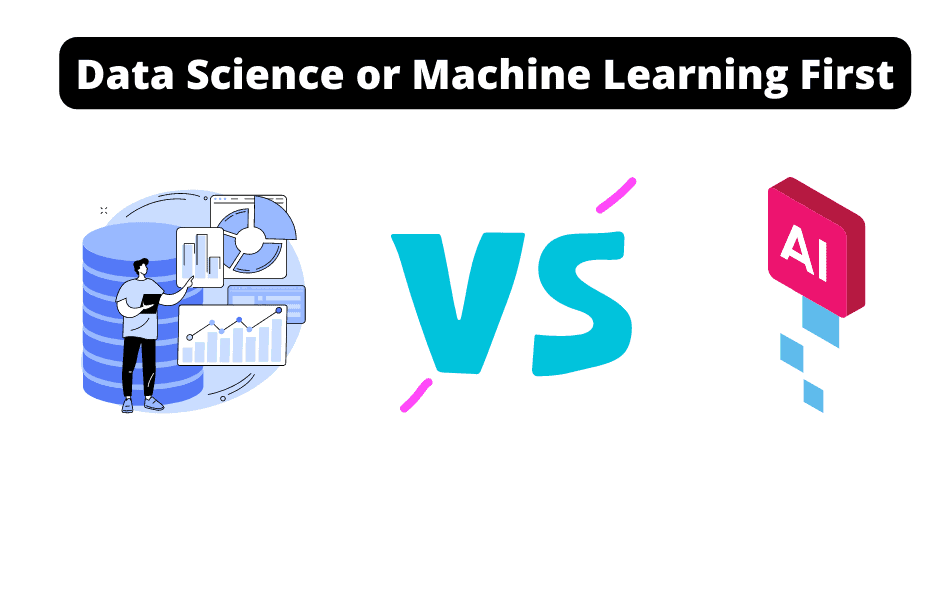Getting started is tough, and choosing between learning data science or machine learning first is difficult.
While they may seem similar, they are actually fundamentally different fields.
Choosing the right path to study can significantly impact your future career, and making the right choice can cut down the time it takes to get one of these jobs A TON.
But don’t worry; we’ve got you covered!
In this blog post, we’ll break down the key differences between data science and machine learning and help you decide which is right FOR YOU.
Keep reading to find out which field is best for you, why we separate these two, and some extra information so you can feel confident about your decision.
Trust us; you won’t want to miss this!

Understanding The Career Path of a Data Scientist and a Machine Learning Engineer
Data science stems from the field of analytics and focuses on making sense of large amounts of data.
A data scientist analyzes data and finds patterns and insights to help a company make better decisions.
Data scientists typically use statistical methods, data visualization tools, and programming languages like Python and R to complete the job.
While coding is a part of the job, it’s usually less prominent than data analytics work.
On the other hand, machine learning stems from the field of software engineering.
While machine learning engineers and data scientists both build these algorithms, machine learning engineers will be coding much more than data scientists.
Machine learning engineers focus on implementing these algorithms and building systems that allow these algorithms to flourish.
While analytics is still a part of the job, due to the software engineering branch, machine learning engineers spend much less time analyzing data.

Are Data Science and Machine Learning The Same Thing?
While data science and machine learning might seem similar, they are actually two distinct fields.
Both fields revolve around building models and making sense of data, but the focus and approach differ.

Data science is closer to the optimization branch of mathematics, where the goal is to make slight improvements to already-built systems.
Data scientists use statistical methods and visualization tools to analyze data and find insights to help companies make better decisions.
They might also build predictive models, but the focus is on finding the best solution within the constraints of the existing system.
On the other hand, machine learning is a software engineering job focused on building the systems themselves.
Machine learning engineers use programming languages like Python and R to write code to build algorithms and systems that can foster these algorithms.
The goal is to build models that can be used for various tasks, such as image recognition and natural language processing.
While data science and machine learning might seem similar, they are very different regarding day-to-day work.
Building a system and monitoring a system are two very different things.
As a data scientist, you will spend more time analyzing data and finding insights into pre-built systems.
As a machine learning engineer, you’ll spend more time writing code and building these systems.
How To Pick Between Learning Data Science or Machine Learning First
When it comes to choosing between learning data science and machine learning first, the answer is pretty simple.
The most critical factor in choosing is figuring out what you enjoy doing.

If you enjoy analyzing data and finding patterns, then data science might be your “perfect” choice.
Also, those with strong statistical and mathematical backgrounds quickly learn data science.
While working as a senior data scientist, most of my team came from academics with Ph. Ds in physics, astronomy, and computer science.
This makes sense as you’ll use statistical methods to analyze data and find insights to help companies make better decisions – things learned in masters and Ph.D. programs.
The transition into a career as a data scientist will be much more fluid, as you already know you enjoy this type of thing, making the end goal much easier to achieve.
If you have a passion for building things and have a system-oriented mindset, then pursuing machine learning first might be the right choice.
This is an excellent path for those from a software engineering-type role who has been writing code and feel confident in their coding abilities.
Machine learning engineers build algorithms that allow computers to learn from data and the skills you’ve previously learned while coding will directly apply to your work.
You’ll use programming languages like Python and R to write code and build models that can be used for various tasks, such as image recognition and natural language processing.
What Would I Do If I Have No Experience In Either?
If you have no experience in either data science or machine learning, it might be a good idea to start by targeting a career in data science.
This approach has been successful for many people who have transitioned into the field.
By teaching yourself to code and securing a data science role, you’ll gain valuable experience and build a foundation that you can use to transition into a machine learning role later on.
We suggest starting with data science first because you can get a job in about half the time it takes to get a machine learning engineer role.
While it might take 18 months or more to gain the necessary experience and skills to get a machine learning engineer role, you can get to work as a data scientist in as little as nine months.

This allows you to start your career and earn money sooner while you continue to build your skills and gain experience.
Once you have gained confidence in your coding abilities and built a strong data science foundation, you can leverage that experience to transition into a machine learning engineer role.
By starting with data science, you’ll gain a deeper understanding of the field and be better equipped to make the transition later on.
Should I Just Learn Both?
While it may seem like a good idea to learn data science and machine learning, it’s better to focus on one area and become an expert in it.
Careers are better with expertise, and by focusing on one area, you can develop a deep understanding of the field and become an expert in it.
You may have to learn about both of them initially to figure out which one you enjoy more, but once you’ve decided, diving deep and focusing on one area is essential.
By doing so, you’ll develop a deeper understanding of the field and be better equipped to make a real impact.
And honestly, people pay more $$$ for expertise and experience.
- Do Managers Earn More Than Software Developers? [Find Out Now] - February 13, 2026
- Deploy Applications in Data Science on Heroku [Boost Your Skills Now] - February 13, 2026
- Mastering the Algorithm for Neural Network [Unlock the Power!] - February 12, 2026

